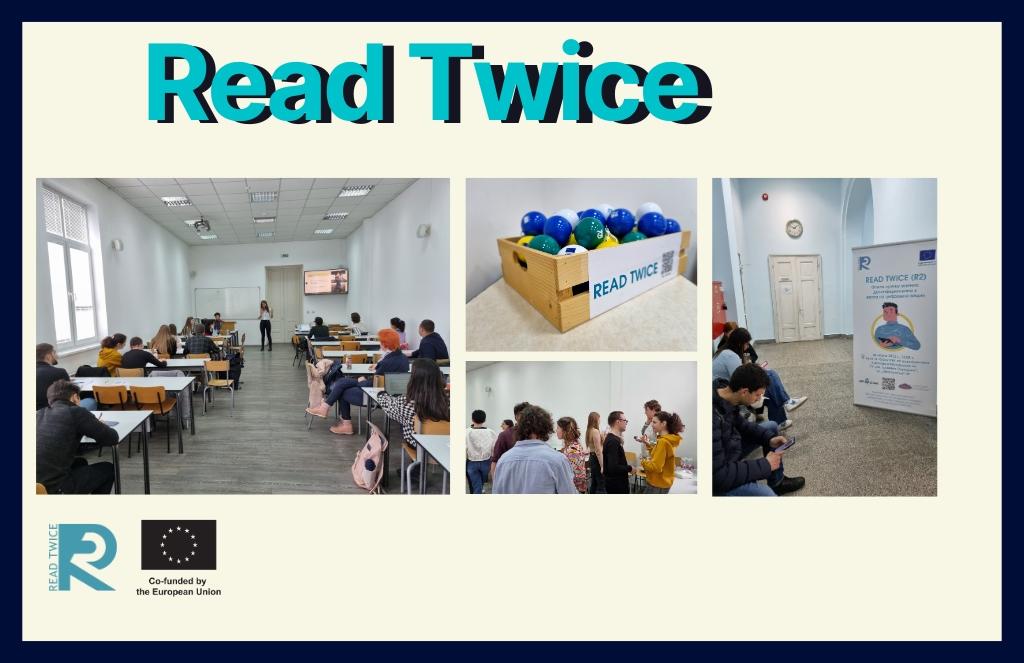Thessaloniki gets ready for its metro launch in November
The underground rapid transit lines have been under construction for almost two decades due to various project delays
 TheMayor.EU logo
TheMayor.EU logo 
The second Read Twice training in Sofia gathered students at the Faculty of Journalism, Source: Euro Advance Association
This is the second student training in Sofia, under the Read Twice project
On 25 April, Euro Advance held a second student training against fake news and disinformation at the Faculty of Journalism and Mass Communication of Sofia University “St. Kliment Ohridski”. Titled “Facts vs. Opinions: Disinformation in the Age of Digital Media”, it forms part of the Read Twice European project, which combats these problems by improving media literacy and encouraging critical thinking.
The innovative format – young people teaching young people – sparked interest among students from different disciplines and created conditions for their active participation.
Assoc. Prof. Svetlana Stankova, Deputy Dean of the Faculty of Journalism of Sofia University St. Kliment Ohridski opened the event by emphasizing the growing importance of the problem with the spread of fake news online and the need for a systematic approach. She recalled the serious consequences of the myths surrounding the spread of COVID-19 and vaccines, illustrating a real dimension of misinformation in our lives.
Aseniya Dimitrova, leader of Read Twice, spoke next adding that the basis of the project is the gap between Eastern and Western Europe according to the Media Literacy Index of the Open Society Institute – Sofia. This is precisely what prompted the team to seek cooperation with organizations from Germany and Portugal to train young media professionals from Bulgaria, Romania and Croatia.
After two capacity-building trainings in Porto and Berlin, the participants summarized what they had learned and prepared materials conduct their own local trainings – at the New Bulgarian University and at Sofia University St. Kliment Ohridski. Preparations for a third workshop are underway.
As part of yesterday’s event, Dimitar Halachev, a Public Relations student at SU St. Kliment Ohridski showed how a manipulated video can take over the web, and played an informative game with the audience. Next, Dara Sapundjieva, who studies journalism and political science at New Bulgarian University (NBU), explained the terminology related to misinformation and through a personal story showed that we can all be vulnerable to false info when our emotions are affected.
Iva Veselinova, a student of European Studies at SU “St. Kliment Ohridski” and Teodora Stamenova, who’s doing political science at the University of National and World Economy and participates at the Advisory Council on Youth Policies of the Sofia Municipality, traced the historical development of fake news and showed some tried and trusted ways of checking facts.
Denis Balgaranov, NBU alumnus and editor at TheMayor.EU, talked about disinformation as an industry and revealed to the audience the price list of some companies for “services” such as disrupting elections, hacking profiles and spreading scandals. Furthermore, Denis showed how language can become a tool of disinformation through sophistry, rhetoric, and so-called “logical fallacies” that obscure the truth in a debate.
Finally, Eneya Georgieva, member of the Association of European Journalists and Editor at ForbesBulgaria demonstrated some of the most effective tools for the work of media professionals in terms of fact-checking, such as Invid and Crowd Tangle.
The event is part of the Read Twice (R2) project, with number 101081326, co-financed by the European Union under the Citizens, Equality, Rights and Values 2021-2027 (CERV) programme.

The underground rapid transit lines have been under construction for almost two decades due to various project delays

Now you can get your wine in Talence by paying directly in Bitcoin

That’s because the state has to spend money on updating the railway infrastructure rather than subsidizing the cost of the popular pass

Rethinking renewable energy sources for the urban landscape

The examples, compiled by Beyond Fossil Fuels, can inform and inspire communities and entrepreneurs that still feel trepidation at the prospect of energy transition

Now you can get your wine in Talence by paying directly in Bitcoin

The 10th European Conference on Sustainable Cities and Towns (ESCT) sets the stage for stronger cooperation between the EU, national and local level to fast track Europe's transition to climate neutrality.

At least, that’s the promise made by the mayor of Paris, Anne Hidalgo

The underground rapid transit lines have been under construction for almost two decades due to various project delays

At least, that’s the promise made by the mayor of Paris, Anne Hidalgo

Hostal de Pinós is located in the geographical centre of the autonomous region

Despite its church-y name, the district has long been known as the hangout spot for the artsy crowds

Urban dwellers across the EU are having a say in making their surroundings friendlier to people and the environment.

Forests in the EU can help green the European construction industry and bolster a continent-wide push for architectural improvements.

Apply by 10 November and do your part for the transformation of European public spaces

An interview with the Mayor of a Polish city that seeks to reinvent itself

An interview with the newly elected ICLEI President and Mayor of Malmö

A conversation with the Mayor of Lisbon about the spirit and dimensions of innovation present in the Portuguese capital














